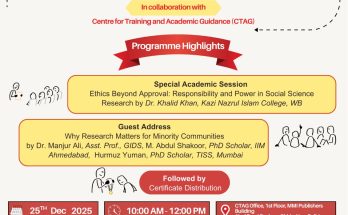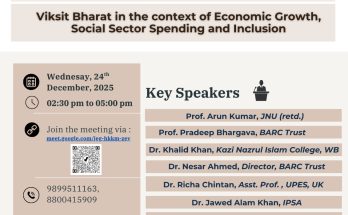Release of the Report
Muslims of Delhi: A Study on their Socio-economic and Political Status
Download Report

The Delhi-based think tanks, Institute of Policy Studies and Advocacy (IPSA) and Indian Muslim Intellectuals Forum (IMIF) have jointly released in a function held on Sunday at Hotel River View, Jamia Nagar, New Delhi a research report on “Muslims of Delhi: A Study on their Socio-economic and Political Status” in the presence of leading academicians and media persons.
The study includes data analysis on fiscal support for minority schemes, employment, education, healthcare, living conditions and political clout in the context of development of Delhi’ Muslims and is based on authentic secondary sources including Census of India, NSSO Round, National Family and Health Survey, Periodic Labour Force Survey, etc. and public perceptions from the Muslim concentration wards of MCD as a primary data source. The pertaining data coincide with the period of political transition in Delhi from the Congress to AAP led government and, thus, they provide a valuable insight regarding the progress of the community under a new regime.
The study underlined that the fiscal share in the overall state budget for the development of SC/ST/OBC/Minorities’ department, that directly takes care of 83% population of the NCT of Delhi including Muslims, has come down from 0.98% in 2013-14 to almost 0.60% since 2015, though the actual amount has partially increased over the years along with the overall state budget. The only scheme for weaker sections in the state that shows consistency in public provisioning is the financial assistance for EWS category under the RTE. It has also been underlined that such autonomous agencies as Delhi Minority Commission, Delhi Waqf Board, NMFDC, Urdu Academy, etc are not functioning to their optimal level.
The educational performance of Delhi’s Muslims does not reveal any promising status in the midst of the hype of special achievements of the state’s educational department, though their literacy rate is somewhat better than in many other states. There is a big gender gap between Muslim males (15%) and females (30%) in terms of illiterates, contrary to the lower national average. The distribution of government educational institutions in the Muslim pockets has not improved even under the present government as noted from the fact that there are average 4 schools per ward run by the state government and MCD in the Muslim concentration wards as compared 10 in all wards.
The unemployment rate for Muslims has been noted at 11.8% as compared 8.6 in the national capital and Muslims are generally engaged in the lowly paying jobs and occupations.
The Mother Mortality Rate (MMR) in the NCT of Delhi has increased from 37 in 2015 to 54 in 2020 and becoming a disturbing health issue, in spite of the claims of good healthcare infrastructure in the state. Muslims must be worst sufferers of the situation as Non-Institutional Delivery is the highest for them (13.7%) as compared all SRCs (8 2%).
In terms of living conditions, the report underlies that 69.70% Muslims avail the piped drinking water contrary to 76.3% of Delhi’s overall residents.
The study finds that one of the major reasons for Muslims’ grave situation in Delhi is that they are inadequately represented in the decision-making bodies, e.g. the number of Muslim MLAs in Delhi remains static around 5.5%, almost one-third of their population in the state. Their representation in the MCD is even lesser.
The policy asks of the report demands increased fiscal support, better implementation of schemes, sensitization of public servants towards a sympathetic approach for the faster development of all weaker sections of Delhi including Muslims and enhancement of their visibility in the decision making bodies at every level.
Guest Speakers:
1. Ashutosh, Editor, Satya Hindi. Com
2. Urmilesh, Senior Journalist
3. Qamar Agha, Senior Journalist
4. Yusuf Ansari, Resident Editor, Shah Times
5. Dr. MH Ghazali, Editor, UNN
6.Abrar Ahmad, IRS (Rtd) Secretary & BOT – IICC
Presentation of the study report by:
1. Dr. Khalid Khan, Assistant Professor, IIDS, New Delhi
2. Kaleemul Hafeez, Convener, IMIF
3. Dr. Jawed Alarm Khan, Founder, Institute of Policy Studies and Advocacy, New Delhi
4. Mohammad Ahmad, M. Editor, Watan Samachar
Chair:
Prof. Khwaja M. Shahid Former PVC, MANNU





